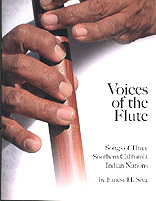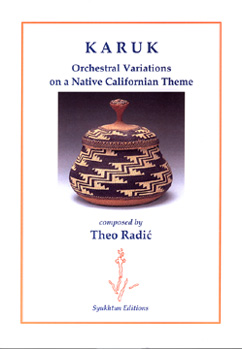






Album with all eight variations
including introduction by the composer
$19 plus shipping
California’s native cultures are given homage in this unique collection
of original guitar compositions based on traditional native melodies,
the culmination of years of prolonged research and concentrated work.
$4 per pdf file |
|
§ SONG OF THE MOUNTAINS (Variation on a Luiseño theme) (sample) |
|
§ GAMBLING CHANT (Variation on an Achumawi theme) (sample) |
|
§ HUNTING CHANT (Variation on a Shasta theme) (sample) |
|
§ FUGUE ON A YUKI THEME (Kekhhoal’s song) (sample) |
|
§ LOVE-MAGIC CHANT (Variation on a Karuk theme) (sample) |
|
§ WAR CHANT (Variation on a Modoc theme) for Leonard Peltier |
|
§ ACORN CHANT (Canon and Variation on a Huchnom theme) (sample) |
|
§ PUBERTY CHANT (Variation on an Achumawi theme)
|
Jaime de Angulo's original field notes for "Puberty Chant" and "Gambling Chant" Tribal map of California

Cahuilla musicians William Levy and brother, near Indio (1907).
(Alfred L. Kroeber Ethnographic Photographs of California
Indian and Sonora Indian Subjects, 1901-1930)
free print-out:
Illustrated Introduction
 >
>
>
>
VOLUME II
(2023)
$25 plus shipping

single pdf files sent by email:
|
§ SONG OF THE ISLANDS (variation on a Luiseño theme) |
|
§ MAHOGANY TREE SONG (variation on a Yokuts theme) |
|
§ LITTLE BEAR SONG (variation on a Serrano theme) |
|
§ SNOWFLAKE SONG (variation on a Paiute theme) |
|
§ BIRD SONG (variation on a Cahuilla theme) |
|
§ BIGHORN SHEEP SONG (variation on a Serrano theme) |

 ”Song of the Mountains” is based on two bars of musical notation in Malki News jotted down by the Cahuilla/Serrano musician Ernest Siva, to whom it is dedicated. It was sung to him by Luiseño elder Margaret Holly, and concerns five sacred mountains of southern California. I have stood on the summits of three of these, and the main mountain of the song, Mount Baldy, is a permanent part of my life. Mount Baldy is called Muuyullpah in the song. (It is known as Joat to the neighboring Tongva, whose homeland was usurped by Los Angeles.) I watched the sun go down behind Mount Baldy my entire youth, and my mother still does.
”Song of the Mountains” is based on two bars of musical notation in Malki News jotted down by the Cahuilla/Serrano musician Ernest Siva, to whom it is dedicated. It was sung to him by Luiseño elder Margaret Holly, and concerns five sacred mountains of southern California. I have stood on the summits of three of these, and the main mountain of the song, Mount Baldy, is a permanent part of my life. Mount Baldy is called Muuyullpah in the song. (It is known as Joat to the neighboring Tongva, whose homeland was usurped by Los Angeles.) I watched the sun go down behind Mount Baldy my entire youth, and my mother still does.
The themes of ”Gambling Chant”, ”Love-Magic Chant", ”War Chant”, ”Puberty Chant" and "Hunting Chant” were among the ”songz” gathered by Jaime de Angulo decades ago in his research into the music of northern Native California. De Angulo could not write standard musical notation, and invented some amazing techniques (decipherable only to himself) to record changes of pitch to help him remember. He knew most of the songs by heart and sang them with great pleasure, although he was not a Native Californian. The texts of these songs in translation can be as varied as "let us two make love with our legs entangled," "digging the earth, only rotten turnips do I find," and, "you are scornful, but your skirts are too short." Two Karuk love songs tell how a girl is missed terribly by her lover after she was abducted from her home and taken to Samfasiskûu (San Francisco) by white slave hunters. For more information see Jaime de Angulo: The Music of the Indians of Northern California, 1988, edited by Peter Garland, Soundings Press, P.O. Box 8319, Santa Fe, NM 87504-8319. More on Jaime de Angulo...
The themes for "Acorn Chant" and "Kekhhoal’s (Old Blind’s) Song” were notated by Stephen Powers in the 1870s on his trek through California at the time of the Ghost Dances, included in his book Tribes of California. The fugue based on this Yuki theme is a study in counterpoint, especially between Native Californian music (of which I know little) and that of Johann Sebastian Bach. It was published in the spring 2000 issue of Gitarr och Luta, the main Swedish magazine for guitar and lute.

Luiseño women at Mission San Luis Rey
(San Diego Historical Society)


Luiseño is a Spanish term derived from mission San Luis Rey in southern California with which these Takic speaking people were associated. They are also known as Payomkawichum, "people of the west". Today their descendants most often use “Luiseño” to refer to themselves.
Achumawi means “dwellers on the river” (ajúm:á is “river”), but it originally referred to a few families living midway up Pit River. Today this northern Californian people refer to themselves as Pit River people.
Shasta refers to another northern Californian people as well as to a sacred extinct volcano in their homeland. Alfred Kroeber states that this name is “veiled in doubt and obscurity. It seems most likely to have been the appellation of a person, a chief of some consequence, called Sasti.” (Handbook of the Indians of California)
Yuki is a term that refers to three related dialects (Yuki, Huchnom and Coast Yuki) and the people speaking them. Kekhhoal’s song was sung in Huchnom. The name Yuki is from the Wintu language: yuke, “enemy”.
Karuk means “upriver”, refering to the Klamath river of northern California, contrasting with their word yurúk, “downriver”, which also refers to their Yurok neighbors downstream.
Modoc is derived from this northern Californian people’s name for Tule Lake: Moatak. They called themselves maklaks, “people”, and offered ferocious resistance to the US army in the Modoc War in 1872-73.
Huchnom means “tribe outside (the valley)”, referring to Round Valley. (See also "Yuki" above.)
Cahuilla (ka-wee-ya) is a name that very likely denotes a different tribe in northern Mexico. “Cahuilla” is not originally a word in this Native Californian language. The Cahuilla people are from the part of southern California where I grew up: San Bernardino and Riverside counties.
Serrano means ”mountain people” in Spanish which refers to the San Bernardino mountains which was their original homeland. They also call themselves Maarringa’yam. In 2002 Dorothy Ramon, the last speaker of the Serrano (Maarringa’yam) language, passed away.
VOLUME II
“Song of the Islands” “This is the Luiseño song that the late Margaret Holly sang for me... Song of the Islands names the four Channel Islands: San Nicolas, Santa Barbara, San Clemente, and Santa Catalina.The birds stopped at each island on their way to the mainland. This is a girl's dance.” (Source: Voices of the Flute, Ernest Siva) (see map)
“Bird Song” To find their way over the vast desert regions of the Southwest, and to correctly time their treks, the native travelers sang bird songs to locate landmarks and water sources along the way, inspired by the habits of migratory birds. This song ”refers to the time when the people separated from each other and scattered all over the world.” (Source: Voices of the Flute, Ernest Siva)
“Little Bear Song” is found in Ernest Siva's book Voices of the Flute. It is a Serrano lullaby that he learned as a child. It is a story about a little bear who had misbehaved and how he was taught a lesson.
“Bighorn Sheep Song” is also found in Ernest Siva's book Voices of the Flute. This animal existed for centuries in the nearby mountains. Now they are extinct. The Bighorn sheep songs tell the story of the creation of this animal, which was an important game animal. Ernest writes: “Traditionally, the singer was also the dancer. He had the sheep rattle [made from its hooves] attached to his leg and sang as he danced.“
“Snowflake Song“ is based on a Paiute melody published in They Came Singing: Songs from California's History by Karen W. Arlen, Margaret Batt, Mary Ann Benson and Nancie N. Kester, Calicanto Associates, Oakland, 2002.
“Mahogany Tree Song“ is based on a Yokuts melody published in They Came Singing: Songs from California's History by Karen W. Arlen, Margaret Batt, Mary Ann Benson and Nancie N. Kester, Calicanto Associates, Oakland, 2002.
“Cloud Chant“ is a guitar duet based on the Achumawi “Cloud Song,“ which was transcribed by Eleanor G. Locke from a radio broadcast on KPFA in Berkeley, California on August 17, 1989. The song was originally recorded by Jaime de Angulo in 1949 from a native singer. The five bars of sheet music for “Cloud Song“ are published in They Came Singing: Songs from California's History.

| Orchestral Variations on a Native Californian Theme
$25 plus shipping sample pages  |
Orchestral Variations on a Native Californian Theme
$25 plus shipping sample pages  |
Orchestral Variations on a Native Californian Theme
$25 plus shipping sample pages 
|


Voices of the Flute
Songs of Three Southern California Indian Nations
by Ernest H. Siva
Price: $35 plus 7.75 percent California sales tax if applicable
Please add $5 for shipping
contact us for wholesale and educational rates:
Ushkana Press
P.O. Box 1510
Banning
CA 92220 USA



syukhtun.net domain name is trade marked SM , All Rights Reserved





